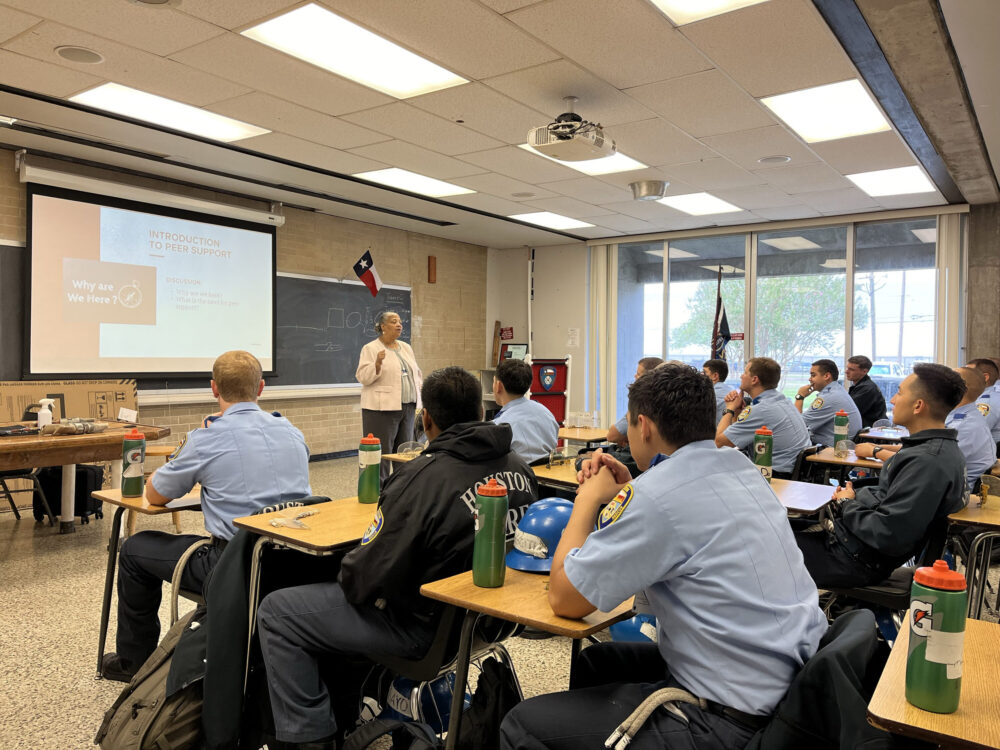
Colleen Deguzman
A couple dozen cadets for the Houston Fire Department spent Wednesday morning in a burning building simulation — they were learning how to breathe while rescuing people in a fire.
Afterward, they filed into a classroom to learn about how to take care of their mental health while on the job.
“Mental health is physical health,” said Angelina Hudson, CEO of the National Alliance on Mental Health’s Houston chapter.
Hudson led the workshop, the first of its kind for the Houston Fire Department. She unpacked the numerous mental health challenges firefighters are more vulnerable to because of the nature of their job, such as PTSD, depression and anxiety.
Although firefighters and other first responders are at more of a risk for mental health disorders, Hudson said they are less likely to reach out for help when they need it.
“There’s this idea that if that, ‘if I’m dealing with stress or depression or anxiety and it’s too much for me, then guess what? I’m not going to get that next promotion,’” she said. “’They’re going to think I’m too frail. They’re going to think that I don’t have what it takes to do this job.’”
Around a fifth of firefighters and paramedics across the country meet the criteria for post-traumatic stress, according to a study by the Journal of Occupational Health Psychology, compared to a 6% risk in the general public.
And unaddressed mental health problems can further exacerbate a person’s distress, Hudson explained.
A national study by Florida State University found that half of a group of more than 1,000 firefighters had suicidal thoughts at one point in their career, and about 16% reported one or more suicide attempts.
To the class, Hudson asked, “What are the usual reasons people don’t ask for help?”
“Stigma,” one cadet said. Another said “Denial.”
That’s all the more reason, Hudson said, that the cadets should learn to lean on one another.
“Peer support in a nutshell reduces stigma,” she said.
Hudson explained to the group that if their body was a car, their brain was the engine.
“If you have great biceps and triceps and wonderful glutes, if you got all that going but your brain isn’t where it needs to be, that’s the engine to the car,” she said. “You don’t function without your brain.”
Isaiah Garcia was one of the cadets in the classroom, and he said he hopes the class continues to be taught to future cadet classes.
“It’s a good class and they should keep doing it because I don’t want to take my problems home and let them out on anybody that doesn’t deserve to deal with my problems if I can deal with them on my own,” Garcia said.
The Houston Fire Department has around 3,500 firefighters, and Leah Belsches is one of two psychologists for all of them. She said around 300 to 400 of them seek out counseling every year.
Belsches said depression and anxiety are among the top reasons firefighters reach out to her.
“It’s interesting because it’s not always the first incident and it’s not always the most recent or last incident as well that’s bringing them to us, but it’s oftentimes a compounding effect,” she said. “So it’s, ‘I can’t stop thinking about something that happened back in 2017, something happened back in 2021.’ So these things that almost come back to haunt them, that they’ve been carrying with them for so long.”
Belsches said she hopes to continue to weave mental health workshops into cadet training.
“We’re really trying to get in the mindset of front-loading resources instead of giving it to them in a reactive approach and after the fact,” she said.




![Tyson Foods Plant [Photo: Food Manufacturing]](https://southarkansassun.com/wp-content/uploads/2023/08/iStock_1185520857__1_.5e441daa51cca-600x337.jpg)








![Silverado Senior Living Management Inc. [Photo: Los Angeles Times]](https://southarkansassun.com/wp-content/uploads/2023/10/download-6-4-600x337.jpg)

![China's Wuhan Institute of Virology [Photo: Nature]](https://southarkansassun.com/wp-content/uploads/2023/09/d41586-021-01529-3_19239608-600x337.jpg)















